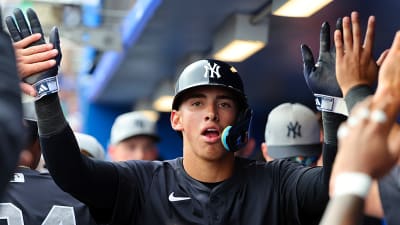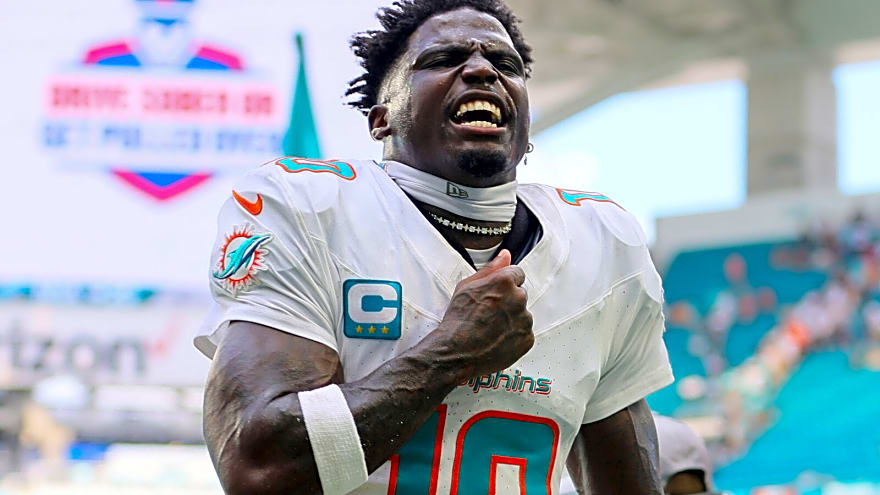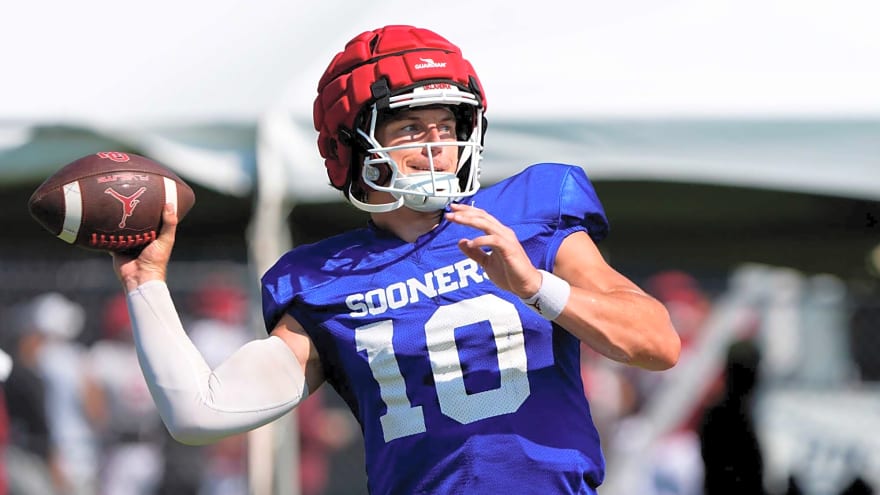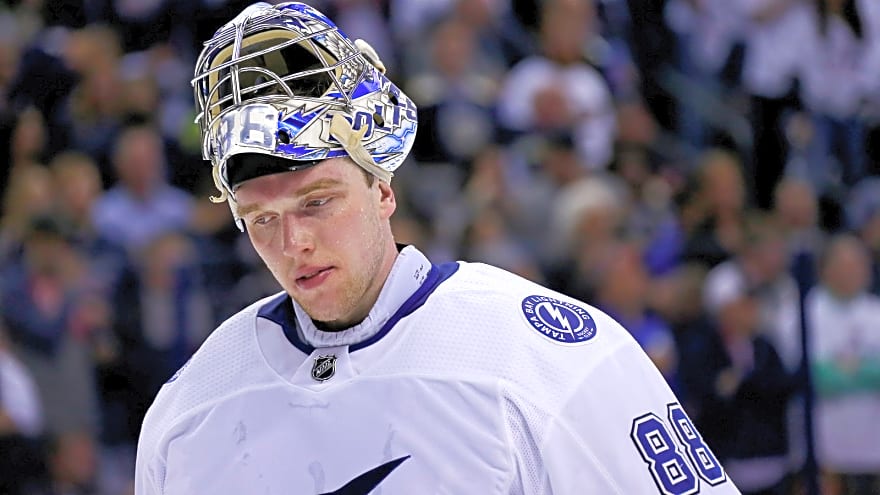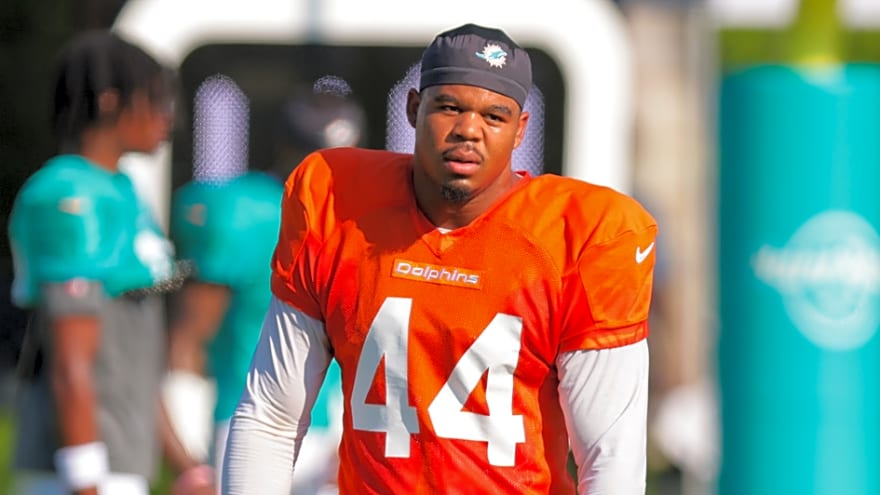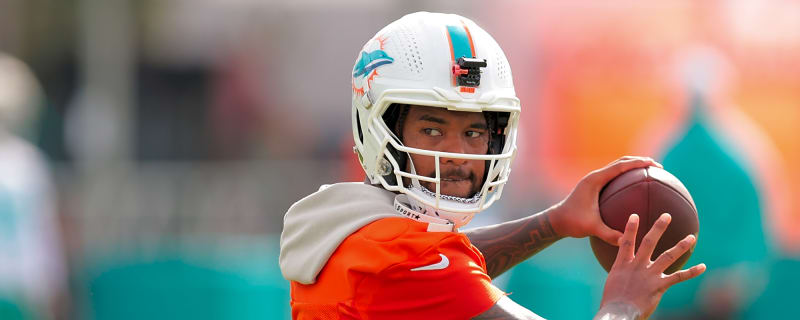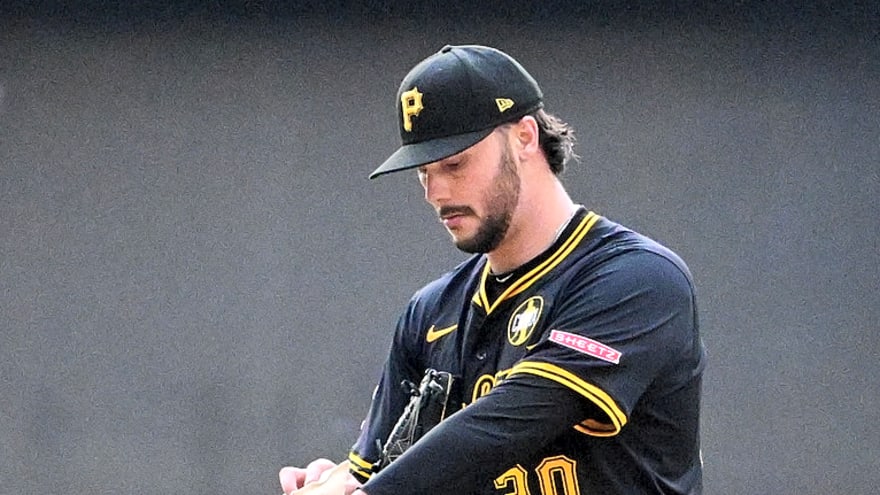
Returning University of Michigan tight end Marlin Klein is "super excited" for the arrival of new offensive coordinator Chip Lindsey and future QB1 Bryce Underwood. Underwood enrolled early at U-M and has started practicing with the team this week. Early reports indicate the hype is real and the high school phenom has exhibited the physical traits needed to dominate at the next level. Those traits will be honed by the new OC and his insane skill set will certainly benefit a guy like Klein. Being an early enrollee will allow Underwood extra time to acclimate to D1 football, learn the playbook, and establish a rapport with his offensive teammates.
“I’ve seen him a lot now," Klein told the media this week. "Obviously, super excited for him to come in. Being signed with this great university, I think he’s going to give us a great shot next year. Obviously, he's not going to come in here and just start right away, because there are a lot of guys that have been here and worked their butts off to be in the position that they’re in right now. But super excited to see what he can do. He can spin the rock, that’s for sure."
When it comes to the offense itself, Klein is happy with the hire of Lindsey as the newest offensive coordinator.
“I thought it was great,” Klein said. “But ever since I got here, I trust Coach Moore, or even Coach Harbaugh when he was still here to make the right hire. So I totally believe that was the right hire for us, and just super excited. I got to hear a little bit about his experience feeding the tight ends at UNC, so just super excited for next year.”
Lindsey is renowned for his balanced offensive strategy that prominently features tight ends, upholding a long-standing tradition at the University of Michigan. Last year at The University of North Carolina, his tight ends accumulated for 900 receiving yards and 11 touchdowns. This promising performance bodes well for Klein's productivity in 2025.
With All-American Colston Loveland departing the program to pursue NFL success, Klein possesses the ability and size (6'6", 247 lbs) to fill part of the void left by Loveland. Tight ends are widely recognized as a safety valve for new quarterbacks and Klein will undoubtedly be in Underwood's ear, assuring him of his support for his success. Regardless of who steps in as quarterback next year, they would be wise to acquaint themselves with Klein and his exceptional catch radius.
More must-reads:
- What to know about the 10 hottest college football QB battles
- Oregon suspends former five-star WR recruit indefinitely
- The '2023 NFL AP second-team All-Pro' quiz
Breaking News
Trending News
TODAY'S BEST

NFL legend Tom Brady unleashes on current climate in college sports
NFL legend Tom Brady isn't happy with the current climate in college sports. Fueled by money — specifically, revenue-sharing and name, image and likeness deals — along with the transfer portal's explosion and ongoing conference realignment, Brady says a reality check is needed in collegiate athletics. "But because we’re just talking about money, money, money, money … that’s the only value in college? Is that what we’re saying? To me, the priorities are a bit messed up," Brady said in a conversation with Fox Sports' Joel Klatt on the "Big Noon Conversations" podcast. College sports, in particular football and basketball, are a big business, and Brady recognizes that. At the same time, given NIL and other factors, there isn't a ton of loyalty in the college game, as players switch schools all the time. Plus, as Brady notes, these players are missing out on the college experience that he had while playing quarterback for Big Ten Conference powerhouse Michigan from 1995-1999, because they're competing for two or three schools. "I didn’t go to three different colleges," Brady, who won seven Super Bowls in the NFL, continued. "I didn’t leave college when it seemed like I wasn’t gonna play. I wasn’t at college to do anything other than have a great college experience, to go to school, to have camaraderie with my teammates and to compete at a high level. That’s really where the focus was. And at a young age, that’s where I think the focus needs to be." Brady doesn't blame the players. They're teenagers or in their early 20s when suiting up for college teams. He says that players' parents have to protect them. It's even more complicated these days (and tempting) because of the money being offered to top-ranked prospects, and some of these young men also have agents now. "It’s very intriguing to get that quick dollar," Brady said. "Look, we had a $400 scholarship check, and it seemed like I was rich. It really did. I’m sure most kids felt like that. We got pizza cards to go to dinner, and we had a training table, and it was an amazing experience. We didn’t think about the money." Brady says his time at Michigan prepared him for the pro ranks. He was in college for four years but didn't become the Wolverines' starter until his junior season. While Brady was a good college quarterback, he wasn't elite. He was selected in the sixth round of the NFL Draft and used that as motivation to prove that he belonged in the pros. What then transpired was Brady evolving into the greatest quarterback in the history of the NFL. He says young players today are too quick to move to a different school if they're not getting enough playing time. "The lessons I learned in college — and certainly about competition — those traits transformed my life as a professional. I was ready to compete against anybody, because the competition in college toughened me up so much that I had a self-belief and self-confidence that whatever I was faced with, I could overcome that," Brady said. Brady isn't saying that money isn't important. But he is saying what many others are thinking. The emphasis on money in college sports is concerning and problematic. "We’re valuing the wrong things," said Brady.

3 Ways Craig Berube Is Changing the Maple Leafs’ DNA
When Craig Berube took over behind the Toronto Maple Leafs bench in May 2024, it wasn’t just about swapping one coach for another. Toronto brought him in to change the way the team thinks, plays, and competes. Less about tweaks, more about rewiring the team’s DNA. DNA Change 1: The Maple Leafs Have Moved From Star Reliance to Team Accountability For years, the Maple Leafs leaned on pure offensive talent to cover for defensive lapses. Berube’s not buying it. Under his watch, everyone—from Auston Matthews to the last guy on the fourth line—is held to the same standard. If you don’t compete shift to shift, you won’t get minutes. That doesn’t mean the stars won’t shine, but they’ll have to do it while committing to a 200-foot game. Matthews’ defensive reads are now a feature, not a bonus. William Nylander is being pushed to round out his play. And role players like Matthew Knies or Nicolas Roy have a clear mandate: excel in your lane. DNA Change 2: The Maple Leafs Have Moved to Structure Over Chaos In the Berube era, the Maple Leafs won’t be the same freewheeling team fans have known. Expect layers of structure—consistent forechecking, five-man defensive units, and smarter puck management. It’s hockey built for playoff survival, not just regular-season fireworks. That might mean fewer highlight-reel plays, but it’s the kind of style that doesn’t break under pressure in May. Of course, the jury remains out on the success of this venture. DNA Change 3: The Maple Leafs Now See Culture as a Competitive Edge Perhaps Berube’s biggest shift is intangible: culture. He’s stripping away the drama and replacing it with clarity and purpose. In St. Louis, that approach turned a last-place roster into Stanley Cup champions in 2019. In Toronto, it’s already giving young players and depth guys a clear role, while keeping the stars invested in the same system. That unity—between front office, coaching staff, and players—is something the Maple Leafs have chased for years. If Matthews can emerge as a leader in this venture, all the better. The Maple Leafs Might Not Win Pretty, But … The 2025–26 Maple Leafs might not always win pretty, but if Berube’s changes stick, they’ll be harder to play against, more resilient in tight games, and less likely to beat themselves. And that, in Toronto, might be the real breakthrough.

Celtics' ownership move should concern Lakers governor Jeanie Buss
Lakers governor Jeanie Buss is supposed to remain in charge of the team for years even after the sale. Given what just happened with the Boston Celtics, it might only be months. When the Grousbeck family sold the Celtics for $6.1B in March, ESPN reported that Wyc Grousbeck would stay on as the Celtics CEO and governor through the 2027-28 season. Now, new owner Bill Chisholm will take over once the sale is final. That should concern current Lakers team governor Jeanie Buss, whose family sold a majority interest in the Los Angeles Lakers to investor Mark Walter. Buss is supposed to stay on as team governor for "at least a number of years," according to ESPN's Ramona Shelburne, but new NBA owners haven't been keen on waiting to take control of teams recently. Mark Cuban thought he would continue running the Dallas Mavericks when he sold a controlling interest to the Adelson family in November 2023. Before the end of that season, when Dallas advanced to the NBA Finals, new team governor Patrick Dumont, the son-in-law of Miriam Adelson, was firmly in charge. General manager Nico Harrison reported directly to Dumont, which is how Luka Doncic ended up traded to the Lakers despite Cuban's objections. It might be different with the Lakers. Walter has owned a minority share in the Lakers since 2021, so he's had a working relationship with Buss. Her role as team governor may be a condition of the sale itself. With the team preparing for a long-term future with Doncic, Walter and his fellow owners might opt for continuity in the team governor role. But in general, people do not spend billions of dollars on a professional sports team so that someone else can be in charge. Buss is in charge of the Lakers now. Recent history says she won't be for long.

Five best NFL offseason value signings on defense: NFC East rivals earn high marks
Money burned through NFL front offices this offseason, with billions spent on extensions and free agents. Most of the big-money signings — including extensions given to edge-rushers Maxx Crosby, Myles Garrett and T.J. Watt — are easy to justify even with the exorbitant price tags attached. However, others appear to offer exceptional value relative to their costs. Below are signings from five defensive positions (tackle, edge, linebacker, cornerback and safety) this offseason that already look good and have a decent chance of becoming more attractive in the coming years. Here's our list of the five best offensive value signings. Dallas Cowboys defensive tackle Osa Odighizuwa Contract: Four years, $80 million ($52M guaranteed) Odighizuwa started all 17 games for the Cowboys last season for the third consecutive season. He had a career-best year, ending 2024 with 47 tackles, 4.5 sacks and a forced fumble, and ranked No. 12 among defensive tackles in ESPN's pass-rush win rate rankings, his second consecutive season ranking in the top 20 in the metric. In 2023, he finished fourth. Odighizuwa's extension pays the 2021 third-round pick $20M annually (AAV), which ranks No. 12 among interior defensive linemen. While the Cowboys have botched negotiations with outside linebacker Micah Parsons, who requested a trade earlier this month, Odighizuwa's extension serves as the crown jewel of their offseason. And with uncertainty surrounding the two-time first-team All-Pro edge, Odighizuwa could be even more important to the Cowboys defense this season. Kansas City Chiefs edge-rusher George Karlaftis Contract: Four years, $93M ($62M guaranteed) The edge market exploded this offseason, with Crosby, Garrett and Watt all at one point signing record-breaking contracts, the latter two becoming the first $40M per year defensive players. Sliding further down the scale was Karlaftis, whose rookie extension places him 11th among edge-defenders. Last season, Karlaftis, the No. 30 overall pick of the 2022 NFL Draft, ranked fifth among edge-rushers in total pressures, per Pro Football Focus data, finishing the regular season and playoffs with 76. San Francisco 49ers linebacker Fred Warner Contract: Three years, $63M ($56.7M guaranteed) The 49ers have benefited from a league-wide devaluation of linebackers, extending four-time All-Pro Warner to a contract that will pay him $21M annually through 2027. He's the highest-paid linebacker on a per-year basis and well worth it based on his production. Warner ranks fourth in tackles since entering the league in 2018 and is the only active player currently on an NFL roster with at least 10 career sacks, interceptions and forced fumbles apiece. New York Giants cornerback Paulson Adebo Contract: Three years, $54M ($38.5M guaranteed) Adebo's signing largely flew under the radar this March. But during an offseason when corners Ahmad Gardner, Derek Stingley Jr. and Jaycee Horn signed extensions with an average $82.1 million guaranteed, the Giants got excellent value. From 2023-24, Adebo tied for sixth among defensive backs in passes defended (28). Since entering the league as a 2021 third-round pick, he's one of 11 corners with at least 10 interceptions, a category New York finished 31st in last season with five. Houston Texans safety Jalen Pitre Contract: Three years, $39M ($29.156M guaranteed) The 2022 second-rounder was fitting nicely into his role as a nickel corner last year before suffering a season-ending pectoral injury in Week 12. He hasn't reached the heights of his great rookie season (when he had five interceptions and 147 total tackles) in the years since, but at $13M per year (tied for the 12th-highest among safeties), that's a reasonable price to pay for a player who might just be coming into his own.
Customize Your Newsletter
 +
+
Get the latest news and rumors, customized to your favorite sports and teams. Emailed daily. Always free!



